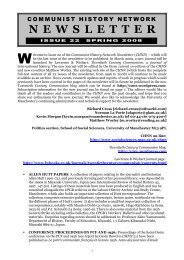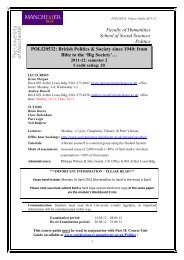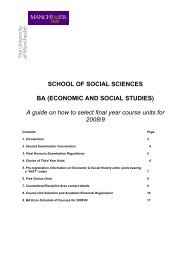second year course outlines 2012-2013 - School of Social Sciences ...
second year course outlines 2012-2013 - School of Social Sciences ...
second year course outlines 2012-2013 - School of Social Sciences ...
You also want an ePaper? Increase the reach of your titles
YUMPU automatically turns print PDFs into web optimized ePapers that Google loves.
follow. Reading the <strong>second</strong>ary literature as you go will help you to understand the primary<br />
literature and will give you ideas <strong>of</strong> things to say about it. When it comes to writing your<br />
essays<br />
and revising for exams, you must read a significant amount <strong>of</strong> material from the further<br />
reading<br />
sections. If you don’t, your answers will appear superficial. You should also make use <strong>of</strong> the<br />
general reading list, there’s lots <strong>of</strong> useful material there. For each topic, I have starred (*)<br />
three<br />
further readings that I think are useful places to start.<br />
Some <strong>second</strong>ary readings largely historical (i.e. ‘what is the best way to understand<br />
Heidegger’s<br />
claim that P?’), while others largely systematic (i.e. ‘Heidegger claims that P, but is P true?’).<br />
It is<br />
possible to take either approach with any topic. However, it is worth considering that the two<br />
approaches are related—a good principle to adopt when interpreting a philosopher is to try<br />
to<br />
understand their claims in a way which makes them plausible.<br />
There is a set <strong>of</strong> questions for each week’s tutorial. Think hard about these and write<br />
answers to<br />
them. You need to arrive at the tutorial prepared to speak on the topic, and this is much<br />
easier if<br />
you have something written down.<br />
Lectures 2-4 are the essay topics. Lectures 5-12 are the exam topics. The exam will contain<br />
6<br />
questions, drawn from each <strong>of</strong> these topics, <strong>of</strong> which you can answer any two. However, it is<br />
important to bear in mind that (i) the topics are <strong>of</strong>ten closely interrelated; (ii) questions may<br />
be on<br />
any aspect <strong>of</strong> the material covered.<br />
As much as possible from this reading list is either available online, or has been specially<br />
digitised<br />
by the library. In the majority <strong>of</strong> cases where this has not been possible, items have been<br />
added to<br />
the short loan library.<br />
O source available online<br />
D digitised source available at library<br />
S short loan<br />
There is a vast amount <strong>of</strong> literature on Phenomenology. Just because something is not on<br />
the<br />
reading list does not mean that it isn’t worth reading. So explore. However, stick to reputable<br />
sources—well-known journals, books from academic presses—don’t just copy out what<br />
some<br />
chump you’ve never heard <strong>of</strong> says on an obscure website. It will almost certainly be crap.<br />
Lecture 1 (Week 1): Introduction to Phenomenology<br />
There is no required reading or tutorial this week. However, you might like to have a look at<br />
the<br />
following:<br />
Cerbone, D. 2006. Understanding Phenomenology. Chesham: Acumen, Introduction.<br />
Gallagher S. & Zahavi, D. <strong>2012</strong>. The Phenomenological Mind, 2nd Edition. London:<br />
Routledge, Introduction.<br />
Routledge.Moran, D. 2000. Introduction to Phenomenology. London, Routledge,<br />
Introduction [O]<br />
10<br />
Lecture 2 (Week 2): Intentionality I – the mark <strong>of</strong> the mental (Brentano)<br />
Required Reading:<br />
47

















